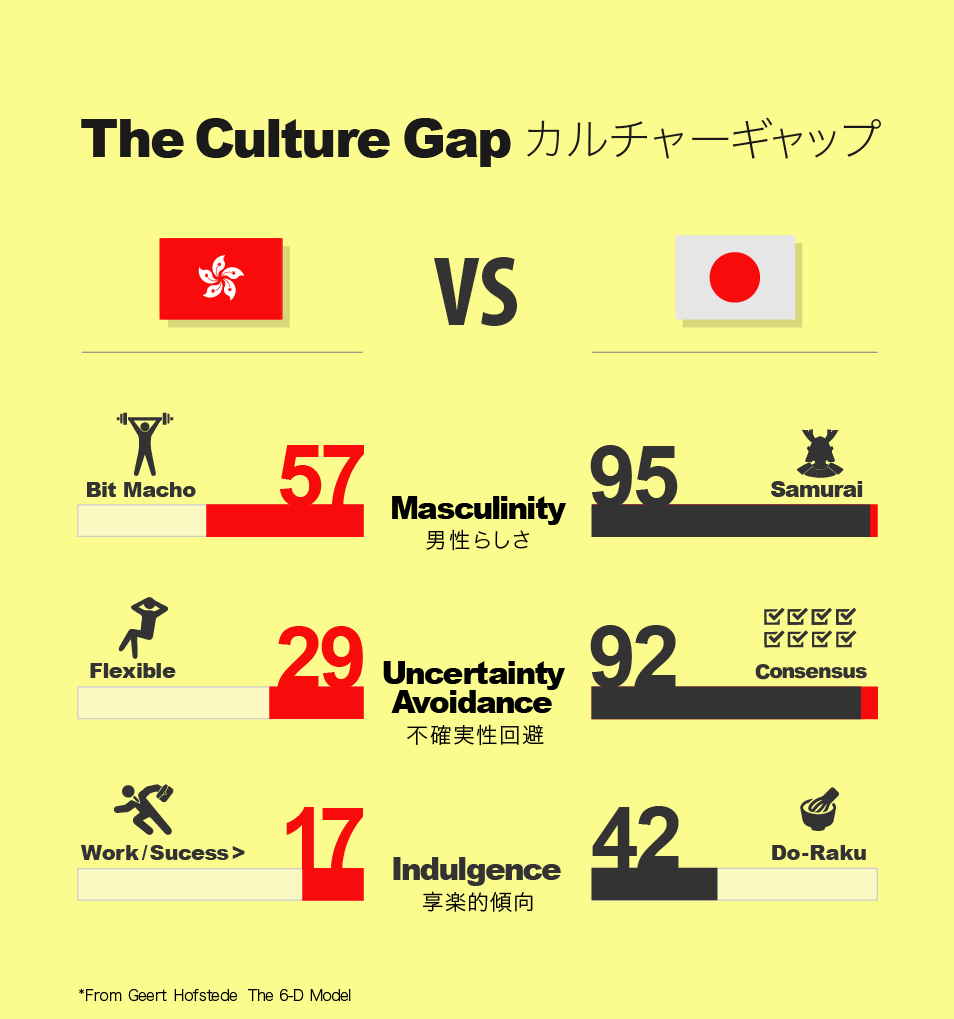世界で最も論文引用件数の多いオランダの社会心理学者
ヘールトホフステード。彼の作った国民性の指標を計る6次元モデルの分析結果から、香港と日本で特に違いが際立っている3つの指標を比べてみた。
(1)男性的な社会か、女性的な社会か?
項目はその国が男性的か女性的か?ということについて。日本社会は男性的であるという指標が95%と高い。対して香港は57%で、男性的か女性的のほぼ中間の数字となっている。
男性的な社会は競争や野心、パワーといったことに重点を置きやすい。日本がまさにこれにあたっているということが見て取れる。一方、女性的な社会では人々の関係性や人生の質ということに重点が置かれるとされるので香港はちょうどその中間的な位置にあるようである。
香港でもテストなどの競争では高いスコアを得て成功しなければいけないという価値観が浸透していて、男性的な社会としての性格も少なからずあることになる。
(2) 曖昧さを避けたがる社会であるかどうか?
文化人類学者エドワード・ホールによれば、日本も中国もハイコンテクストの文化、つまり「言わなくてもお互いになんとなくわかるよね」という文化であると分類されている。逆にドイツやアメリカは「言わなければわからない!」というローコンテクストの文化である。
でありながら、香港の曖昧さ回避率は日本の1/3。これは、能率や即効性を最も重んじるために、できれば最小限のわかりやすいルールを設定して物事が早く解決していくことを尊ぶ香港人の性格を反映しているのではないだろうか。
(3)自分の欲求や衝動に抑制的かどうか
この項目でもとても興味深いコントラストが見られた。日本は中間値。ものすごく開放的でもなければものすごく抑制的でもないということになる。対して香港はとても抑制的で17%という低い数字になっている。これは人生のゴールが成功という名前ではっきりと設定されていて、その成功を目指すためには抑制的であるべきだと考えているからではないかと考えられる*
ただ、香港の社会も年々変化して来ていて成功、ゴールの定義は必ずしも一定ではない。例えば不動産の驚異的な高騰も相まって昔ほど簡単に家を購入することもできなくなっている。一方でライフスタイルの選択肢の幅は大きく広がっていて必ずしも抑制的であることが美徳であるわけでもなさそうである。
これまでになんとなく感じていた文化の差異。改めて数値を通してみると今まで見えていなかった性格や差異が体系的に見えてきて面白い。
絶対的な指標ではないが、一つの客観的な分析結果として参考に知っておいて損はないだろう。海外の異文化の中で働く人間には特に有意義だとおもう。
#カルチャーギャップ #異文化マネジメント
* (反対のローコンテクストは論理的で言語自体が明快。含まれる意味が常に限定的。例:英語)
_______________________
We will focus on striking 3 indicators out of 6D of Geert Hofstede for HK and JP.
<1> Masculine or Feminine?
Japan shows its society as the almost perfectly masculine rate at 95%. On the other hand, Hong Kong is about half of 57%.
Masculine society has more competition, power over people, desire.
Feminine society has more gentle, caring, taking care of life quality and relationships with people.
Even though Hong Kong has the very competitive environment in the academic year or getting high scores at any time, Hong Kong seems to have the very balanced on masculinity and Feminity in their society.
<2> How far the society want to avoid ambiguity?
According to Cultural anthropologist Edward Twitchell Hall, Jr., both Japanese and Chinese are high context languages which have rich emotions and meaning in it.*
Thus, it is quite understandable that Japan has so many consensus and documentation avoiding misunderstandings and unwanted errors.
However, regardless of the same type of the high context language, Hong Kong does not seem to avoid the ambiguity much.
It would be reflecting strong Hong Kong’s preference of efficiency than making more processes on the confirmation.
<3> Are they inhibitory on the citizens’desire for their life?
Interestingly, Japanese society has balanced opinion on having good leisure time. Contrary, Hong Kong is very inhibitory society about having leisure time, the indicator rate at only 17%. It is because their life goal is to have the success.
However, society changes rapidly, the choices of the current lifestyle are more diverse. In Hong Kong, it seems that there is not so serious suppression.
It is very interesting to see the cultural differences through the objective analysis result to understand “different feelings” in another country.
Hopefully, it can be useful to manage your cross cultural office or to understand other culture.
#カルチャーギャップ #異文化マネジメント#Culturalgap #crossculturalmanagement
#tya #hk #illustration #advertising #marketing #creative
Reference
https://geert-hofstede.com/national-culture.html
https://www.cicombrains.com/theculturefactor/jetro201604.pdf
https://www.slideshare.net/slideshow/embed_code/key/iIiYEMkonxWEnH

